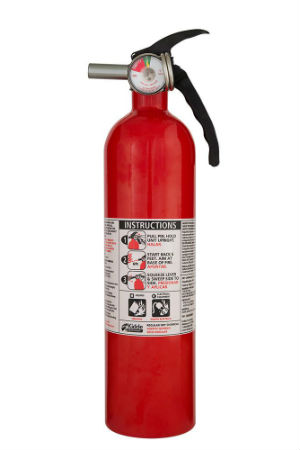

We may earn revenue from the products available on this page and participate in affiliate programs. Learn More ›
Q: I just moved into an apartment that has a fire extinguisher in the kitchen, but I’m not sure if it still works. So I’m wondering: How long do fire extinguishers last? How can I tell if mine is still good?
A: You’re wise to put your safety first and ask these questions because the answers can mean the difference between successfully responding to an emergency and being caught empty-handed. Fire extinguishers last between five and 15 years but they all ultimately expire and become ineffective, no matter what fire-fighting substance they contain. Household fire extinguishers—which are typically filled with dry chemicals (carbon dioxide or halon)—lose their charge over time. Those with compressed gas can leak contents slowly as their seals weaken, while those with ammonium phosphate will solidify over the years, rendering the entire device unusable.
The good news is that some units can be professionally recharged, whether they’re nearing or, in some cases, passed the expiration of their original charge. Read on to get a handle on the age and effectiveness of your fire extinguisher, plus tips on how to extend its life, get it serviced, and dispose of it correctly if necessary.

Check for an expiration date. Look for a paper tag on the fire extinguisher showing a record of maintenance. It may not connote an expiration date, but if the oldest date on the tag was more than 10 years ago, your extinguisher’s days are likely numbered—it may already have lost its ability to fight flames.
Next, inspect the pressure gauge at the top. If the needle is within the green area, your extinguisher should be in working order. If so, set up a monthly reminder on your calendar or your phone to continue checking the gauge. A needle in the red or white area indicates that it requires service.
If the extinguisher has no gauge, it’s probably an older model, which means it would be wise to take it to a professional for testing and, if necessary (and possible), recharging.
Bring the unit to a fire extinguisher expert for a professional determination to see if it can be recharged. To find a local pro, search online for “fire extinguisher specialist” and include the name of your city and state. A professional recharge typically runs between $15 and $20, a bargain compared to a new extinguisher, which will likely cost $100 to $200.
RELATED: 10 Things Your Local Fire Department Wishes You Knew
Store a fire extinguisher in a clean, indoor location can help extend its life. Exposure to sun, UV radiation, wind, or rain can cause corrosion, rust, and deterioration. Excessively dusty or dirty environments can hamper the device’s ability to function properly.
Know the warning signs. There are several telltale clues that your extinguisher won’t work no matter what its age—and that, in fact, it poses a hazard all its own. If the canister is dented or bruised, or if the tamper seal and pin are missing, there’s a possibility that it might explode unprompted. Examine the entire unit and if it’s not in good shape, properly dispose of it without delay.
RELATED: 25 Bad Habits That Could Burn Down Your House

If your fire extinguisher is indeed expired or damaged beyond repair, dispose of it properly. Take it to your local hazardous waste collection site (find one locally with an online search) or local fire department (call first to ensure that the station accepts expired extinguisher drop-offs). Never throw a fire extinguisher into the trash or recycling bin, because it still has hazardous, pressurized chemicals inside that can contaminate the earth or even explode. Depending on where you live, improper fire extinguisher disposal may also be subject to a fine.
